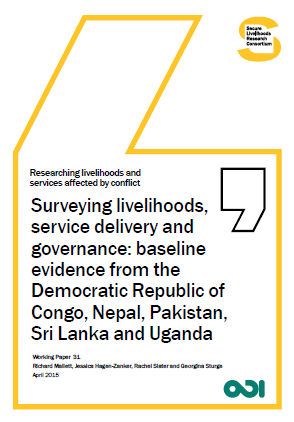This paper shows findings from a cross-country panel survey which took place in five conflict-affected countries: DRC, Nepal, Pakistan, Sri Lanka, and Uganda. The aim of the survey was to explore people’s experiences, perceptions and expectations of the state and local governance actors with regards to basic service delivery, social protection and livelihoods in fragile and conflict-affected situations.
Six key findings emerge when we look across the five analyses, which – to some extent – challenge some of the received wisdom that shapes development efforts in fragile and conflict-affected areas.
- Education is important: households with more highly educated heads consistently have better wellbeing outcomes in terms of both household wealth and food security
- The transition from conflict to post-conflict does not appear to result in renewed efforts to support livelihood rehabilitation
- Levels of satisfaction with basic services are generally quite high, but this does not mean people are receiving high-quality services
- Respondents have overwhelmingly negative perceptions of local and, particularly, central government (except in Sri Lanka)
- An individual’s overall satisfaction with a service or transfer depends heavily on how well specific aspects of that service are run. Access to the service (in terms of distance to a service or transfer receipt) is largely irrelevant
- It is not all about conflict: the five countries are characterized by a history of conflict, yet historical/current displacement and recent sporadic conflict do not affect wellbeing outcomes, access to services or perceptions of the state in any consistent way
These findings are based on the first round of a survey that was conducted in 2012-13. We will return to the same households to conduct the second round of the panel survey in 2015-16.
The Secure Livelihoods Research Consortium (SLRC) is a six-year, eight-country research study, led by the Overseas Development Institute (ODI) in London. SLRC investigates livelihoods, access to basic services, and social protection in fragile and conflict-affected situations. The research is funded by the UK Department for International Development (DfID), Irish Aid, and the European Community (EC). The Feinstein International Center leads SLRC research in South Sudan and Uganda in addition to its participation in the Sierra Leone research.







